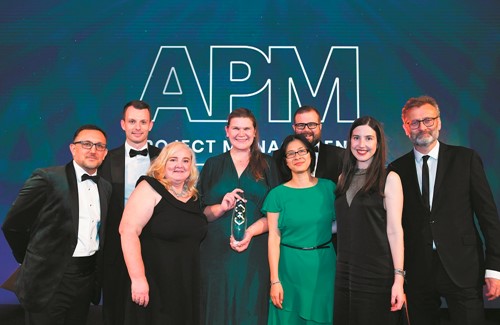Lessons from APM’s Overall Project of the Year

How do you undertake a multi-million pound project to replace a key piece of safety infrastructure involving extremely high-pressure water, running under a key arterial road and railway to the capital city, for one of the busiest airport hubs in the world? Vicky Ye, Project Delivery Manager at Heathrow Airport, was responsible for leading the 2022 APM Overall Project of the Year. Here are some of her most important project management lessons:
1. Contingency plan, contingency plan and contingency plan
Heathrow’s firemain is a 115km network and the recent replacement project sought to address one point of failure through a number of key works that required isolation of the area in focus with comprehensive contingency plans over a crucial eight-week period.
Pulling the support from subject matter experts across the airport’s functions and external organisations was instrumental for the success of the project. It meant co-ordinating with over 30 internal and external teams and ensuring every single affected building or facility had an appropriate contingency plan in place – and with just an eight-month timeline it certainly put my project management skills to the test.
2. Plug the gaps as one team
With just eight weeks until the isolation date, it came to my attention that one of the tenants did not have a suitable contingency plan. To develop and execute a contingency plan that had the capability to put out a fire on the largest-sized aircraft in 47 seconds was the biggest challenge for the whole project. However, within a week, five different suppliers worked together to develop, procure and construct the contingency plan required.
They bonded quickly through the sense of the urgency and the only thing on their minds was to help Heathrow deliver this critical project, going the extra mile to help each other.
3. Give it a go
What made the firemain project so special? In my mind it was the team’s “can do” attitude during the eight weeks that we isolated the firemain. During this period, we replaced an existing multiple-valve chamber, installed a new CCTV inspection chamber, a new multiple-valve chamber, and relined 250 metres of 800mm diameter pipes underneath the A30. To complete these works within COVID-19 constraints as well as space constraints requires careful planning.
For example, to replace two pipes sitting between the top of Piccadilly underground train line and a gas pipe, a Building Information Model was used to envision the work activities and sequence.
4. Put effective governance in place
Due to the potential significant impact on the airport, two levels of governance were employed. One for the decisions impacting the overall airport, the other for the functions or department concerned. The final decision for the project to go ahead was with the Chief Operations Officer who delegated her power to a forum called Heathrow Airport Ltd Assurance and Review Panel (HALARP).
To facilitate the firemain project, instead of the normal monthly meeting, HALARP was held as ad-hoc, as the project required. All the panellists were empowered to voice any concerns, share their views and provide advice on the project. A typical project is presented to HALARP just once but for the firemain project it went to HALARP five times to provide assurance and confidence.
5. Secure buy-in
The success of the project relied heavily on third parties to implement their contingency plans and secure endorsement through collaboration and influence. Bringing over 30 people across functions and organisations on board to explain how critical it was to implement the project was a key objective.
The support I received was overwhelming. I remembered several of them said to me, “Vicky, I know how challenging this project will be, you will have all my support.” Another thing I noticed while leading the contingency plans is the strong sense of the solidarity. In common with Heathrow Airport, our suppliers and external stakeholders had been devastated by the COVID-19 pandemic. After explaining what was required, everyone was so helpful and supportive.
Key to the success of the project was to have great support from the project’s sponsor. My sponsor was very knowledgeable and passionate about this project and had great influence on stakeholders. A strong sponsor was a champion for the project at an executive level and aided the decisive and effective decisions that were made.
Read more APM Award-winning blogs:
7 top tips from a high-flying young project professional in the beauty industry
From Rolls-Royce to Openreach – six lessons for more effective change projects


0 comments
Log in to post a comment, or create an account if you don't have one already.